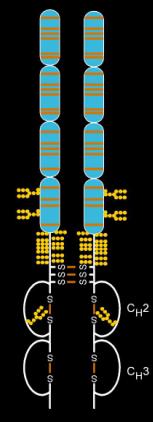Etanercept
 |
|
| Clinical data | |
|---|---|
| Trade names | Enbrel |
| AHFS/Drugs.com | Monograph |
| Pregnancy category |
|
| Routes of administration |
Subcutaneous |
| ATC code | L04AB01 (WHO) |
| Legal status | |
| Legal status |
|
| Pharmacokinetic data | |
| Bioavailability | 58–76% (SC) |
| Metabolism | Reticuloendothelial system (speculative) |
| Biological half-life | 70–132 hours |
| Identifiers | |
| CAS Number | 185243-69-0 |
| PubChem (SID) | 10099 |
| DrugBank | DB00005 |
| ChemSpider | none |
| UNII |
OP401G7OJC |
| KEGG | D00742 |
| ChEMBL | CHEMBL1201572 |
| ECHA InfoCard | 100.224.383 |
| Chemical and physical data | |
| Formula | C2224H3475N621O698S36 |
| Molar mass | 51234.9 g/mol |
Etanercept (trade name Enbrel) is a biopharmaceutical that treats autoimmune diseases by interfering with tumor necrosis factor (TNF; a soluble inflammatory cytokine) by acting as a TNF inhibitor. It has U.S. F.D.A. approval to treat rheumatoid arthritis, juvenile rheumatoid arthritis and psoriatic arthritis, plaque psoriasis and ankylosing spondylitis. TNF-alpha is the "master regulator" of the inflammatory (immune) response in many organ systems. Autoimmune diseases are caused by an overactive immune response. Etanercept has the potential to treat these diseases by inhibiting TNF-alpha.
Etanercept is a fusion protein produced by recombinant DNA. It fuses the TNF receptor to the constant end of the IgG1 antibody. First, the developers isolated the DNA sequence that codes the human gene for soluble TNF receptor 2, which is a receptor that binds to tumor necrosis factor-alpha. Second, they isolated the DNA sequence that codes the human gene for the Fc end of immunoglobulin G1 (IgG1). Third, they linked the DNA for TNF receptor 2 to the DNA for IgG1 Fc. Finally, they expressed the linked DNA to produce a protein that links the protein for TNF receptor 2 to the protein for IgG1 Fc. The prototypic fusion protein was first synthesized and shown to be highly active and unusually stable as a modality for blockade of TNF in vivo in the early 1990s by Bruce A. Beutler, an academic researcher then at the University of Texas Southwestern Medical Center at Dallas, and his colleagues. These investigators also patented the protein, selling all rights to its use to Immunex, a biotechnology company that was acquired by Amgen in 2002.
...
Wikipedia
